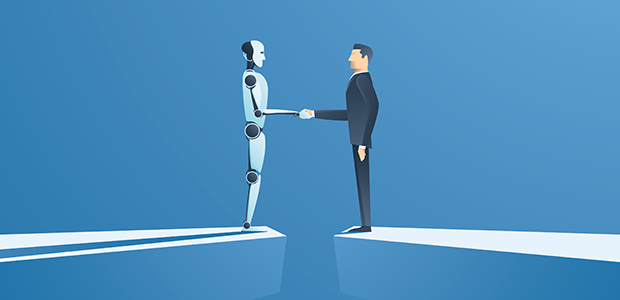
Dublin Tech Summit: the future of AI with Ireland’s AI ambassador
One of the opening keynotes at Dublin Tech Summit this week came from Dr Patricia Scanlon, Ireland’s first AI ambassador, which explored the opportunities and challenges ahead in embracing AI.
“We’re entering the AI revolution,” Dr Scanlon declared. “And it’s a revolution because, if the innovations in AI persist, it will have an impact on society.”
Dr Scanlon kicked off her keynote by asking ‘what is AI?’
Broadly speaking, AI is the ability of a machine to perform a task that would normally require human intelligence.
“If you think back to a year ago, we weren’t really talking about [things like] … AI,” said Dr Scanlon. “In research certainly, but not in public. But now, everybody knows what [ChatGPT] is at this point [for example].”
One thing Dr Scanlon made clear was that AI was coming and we need to be prepared. Already, there have been some great advancements made using AI.
One of those advancements can be seen in the medical field. Scientists have recently used AI to discover a new antibiotic to treat a deadly superbug. The research, published in the scientific journal Nature Chemical Biology, reveals that McMaster University and the Massachusetts Institute of Technology have collaborated to unveil a novel antibiotic capable of eradicating a dangerous superbug commonly found in hospitals. This significant discovery offers hope in the fight against this lethal threat.
AI is also being utilised in education, to help create a more personal, adaptive learning approach for teachers. It’s also freeing up teachers in overcrowded classrooms to perform some of the assessments that give them the information they need to teach.
One last example is of AI being used to process vast quantities of environmental data. This will enable scientists and companies to optimise energy usage, create green energy and be able to forecast the damage that’s come about from the climate crisis.
However, Dr Scanlon noted that there is a flip side.
There’s a big sustainability issue with AI because it’s using vast quantities of data processing and electricity. This is a global problem that we have to address, she commented.
Another important thing to note is AI bias. AI bias is when you build a system with data that doesn't illustrate a full picture of a situation. There is algorithmic AI bias or ‘data bias,’ where algorithms are trained using biased data. The other kind of bias in AI is societal AI bias, so the person who inputs data influenced by their beliefs and understandings into a system.
Dr Scanlon used the example of the Dutch government who were using machine learning to try and detect welfare fraud. There’s a lot of really valuable AI in fraud detection, but this one managed to create its own ‘perception’ of who was a fraudster and it ended up ultimately declassifying 20,000 people from their benefits.
Another issue is around intellectual property. If you’re a musician, artist, or you’ve written a book, all that information is available on the Internet and AI is scraping the Internet for this information to use. So, who owns the finished product?
Dr Scanlon said that there are no answers, and this issue is currently being debated. In a surprise turn of events, the creator of ChatGPT has called on US lawmakers to regulate AI. This came as OpenAI CEO Sam Altman testified before a US Senate committee on Tuesday (16th May) about the possibilities – and pitfalls – of the new technology. Altman suggested potential measures could include the forming of a new agency to license companies focusing on AI as he compared the explosion of its everyday use to be as pivotal as "the printing press", all the while stressing its potential dangers. Giving examples of "a combination of licensing and testing requirements", Altman offered suggestions for how this new US agency could control the industry and be used to regulate the "development and release of AI models above a threshold of capabilities". He even went as far to say his own company, OpenAI, should be independently audited.
Regulation is often associated with stifling innovation, but Dr Scanlon believes that if that was the case, we wouldn’t be seeing innovation in areas such as fintech, biotech, or healthtech as they are heavily regulated spaces, and people still manage to operate.
“Regulation can build good technology and a solid foundation for everybody. It isn’t going to cause problems in the future,” she said.
Another area of concern is around the potential job loss AI will bring about. In a report by investment bank Goldman Sachs, it outlined how AI could replace up to 300 million full-time jobs in the EU and US.
Dr Scanlon offered her own thoughts on this: “I tend to have two conversations in this role. One about job losses and one about whether we will have enough people to do the work on AI.
“Job losses will be real. It happens every revolution. [But] what we need is the upskilling and transfer of skills to the AI space. And it doesn’t have to be technology people – we need people of all skills.”
Dr Scanlon concluded by quoting her 10-year-old son who, when asked what he thought AI was said: “AI is a very powerful technology. It can do great good for humanity. But if it’s used incorrectly, it could be really dangerous.”
About Dr Patricia Scanlon
In 2022, the Irish Government appointed Dr Patricia Scanlon Ireland’s first AI ambassador. Dr Scanlon is also the Founder and Executive Chair of SoapBox Labs, a provider of Voice AI for children.
Dr Scanlon holds a PhD and has 25 years’ experience working in AI and speech recognition, including at Bell Labs and IBM.
An acclaimed TEDx speaker, in 2018 Dr Scanlon was named one of the world’s top 50 women in tech by Forbes and a top ‘Visionary in Voice’ by Voicebot and 2020.

